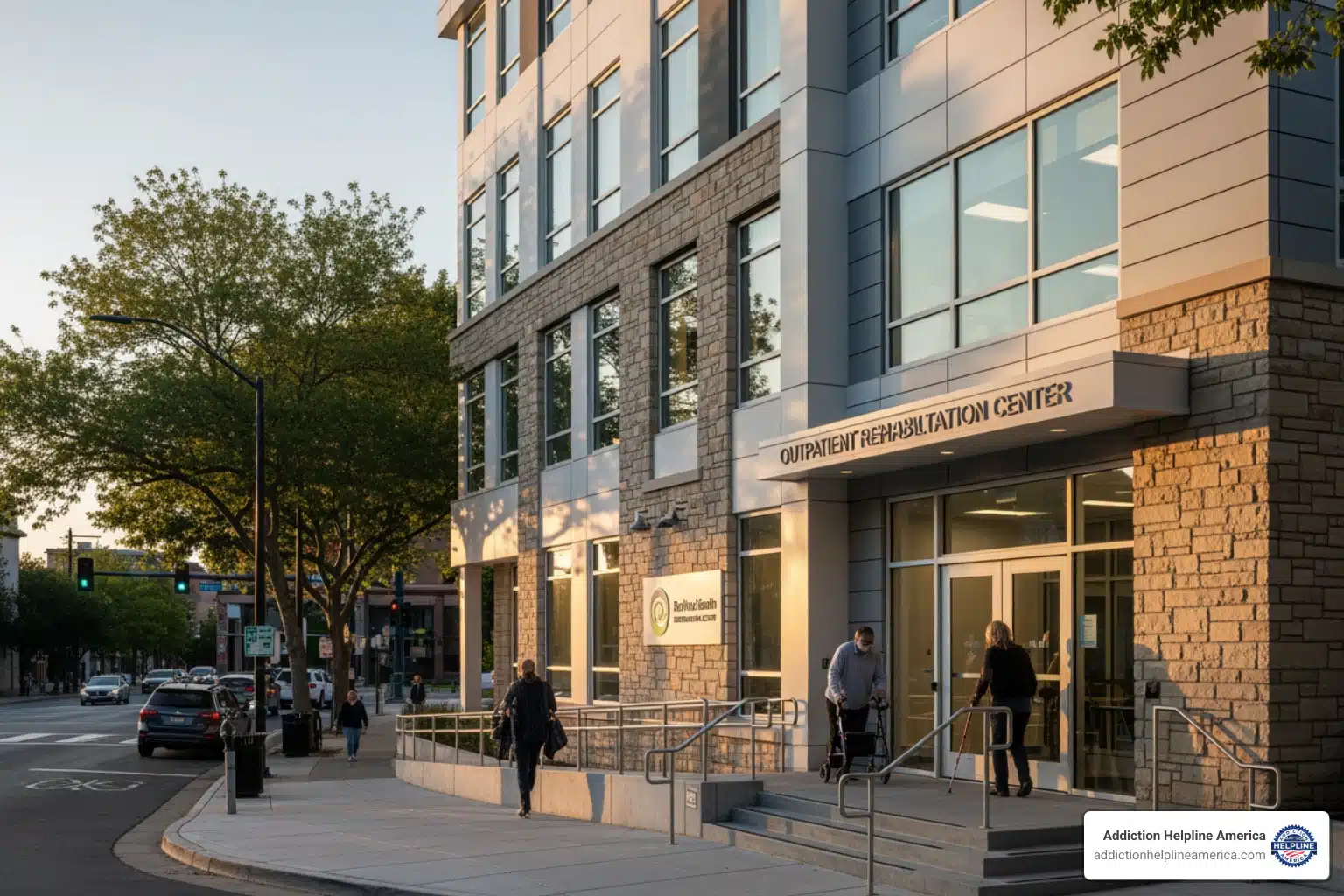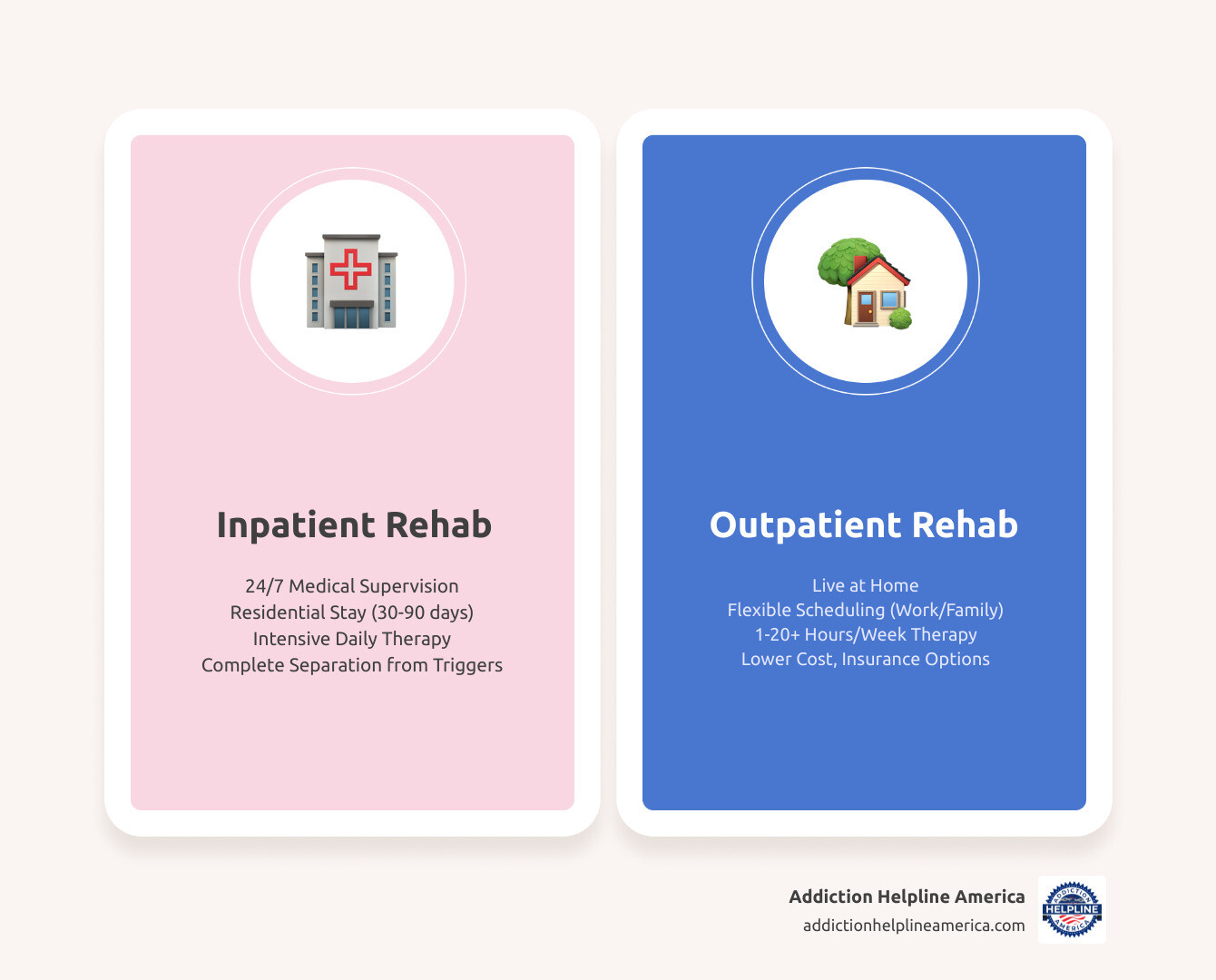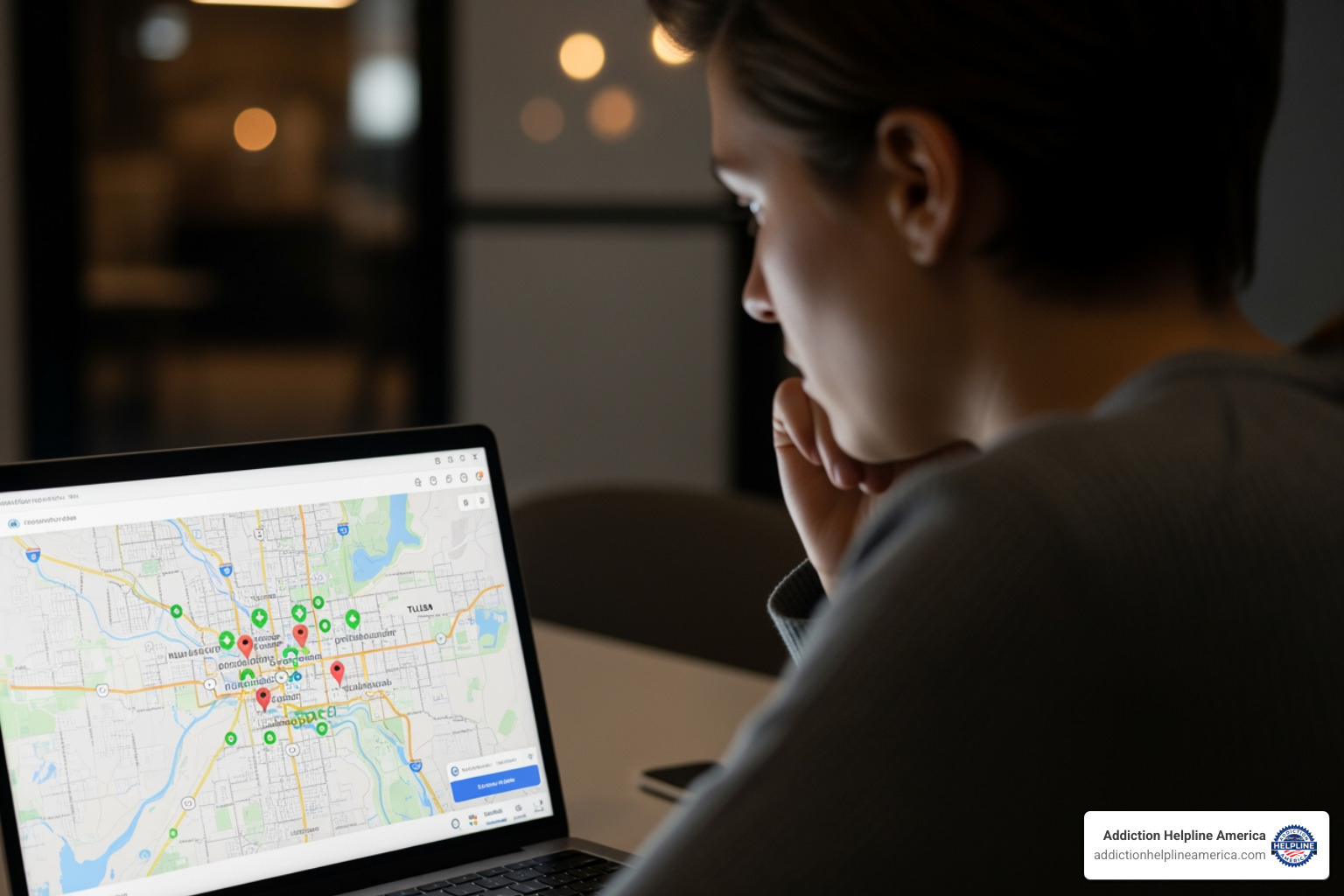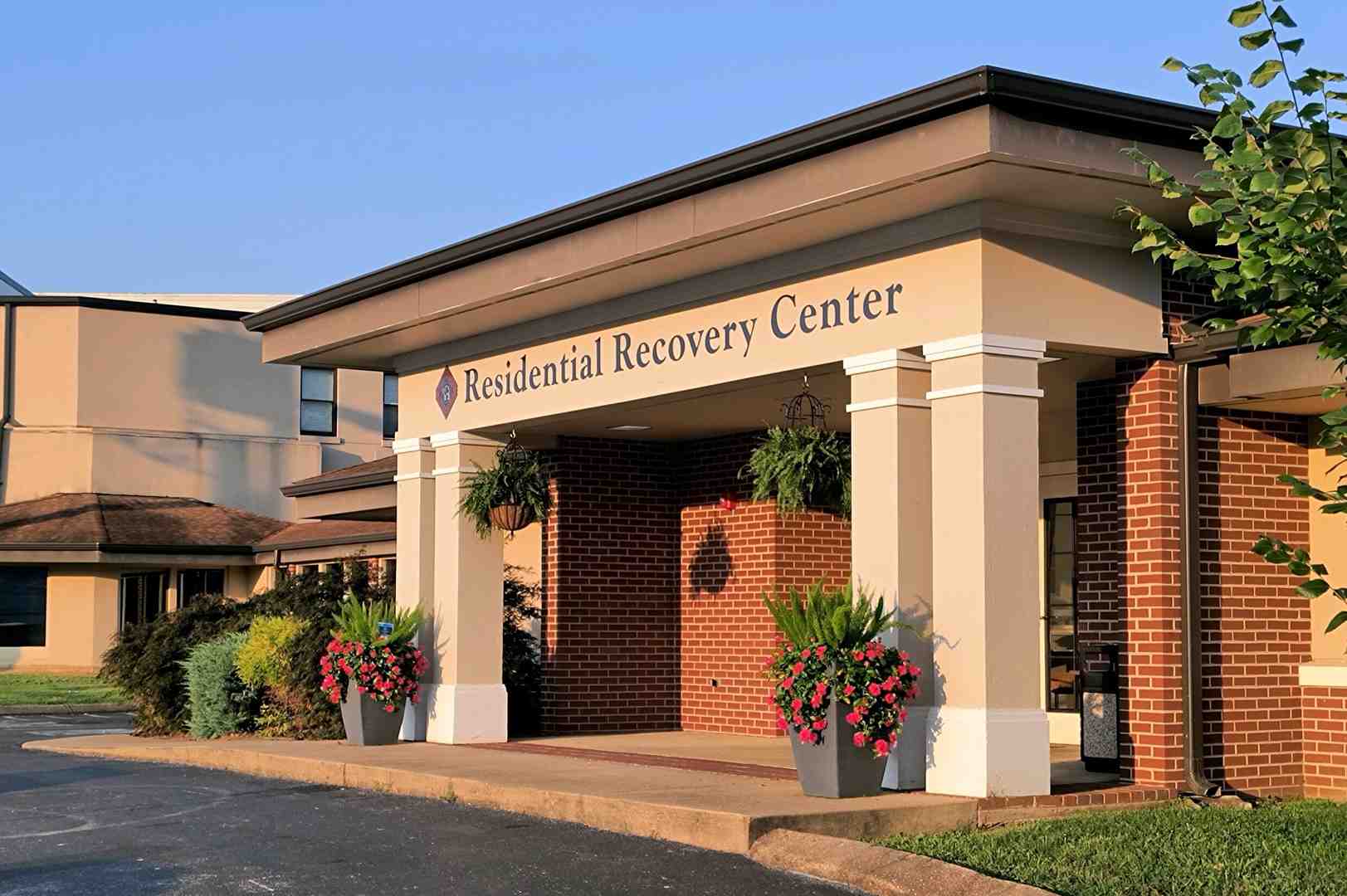
Understanding Your Options for Outpatient Rehab in Tulsa
Outpatient rehab tulsa ok programs offer flexible addiction treatment, allowing you to get help while maintaining your daily responsibilities. If you’re searching for treatment options in Tulsa, here’s what you need to know:
Quick Overview:
- Intensive Outpatient (IOP): 9-12 hours per week of structured therapy and counseling
- Partial Hospitalization (PHP): 20+ hours per week for more intensive care
- Standard Outpatient: 1-3 sessions per week for ongoing support
- Key Services: Individual therapy, group counseling, medication-assisted treatment, family support
- Insurance: Most programs accept Medicaid, Medicare, TRICARE, and private insurance
- Cost: Sliding scale fees and payment plans available at many facilities
Tulsa faces a serious addiction crisis. In 2019, Tulsa County had the seventh highest overdose hospitalization rate in the country, with opiates leading to one in five cases. Prescription anxiety medications accounted for 15% of hospitalizations. Every week, 94 Oklahomans are hospitalized due to drug abuse.
The good news? Recovery is possible, and outpatient rehab offers a proven path forward.
Outpatient programs provide the flexibility to work, care for family, and live at home while receiving expert treatment. They combine evidence-based therapies like Cognitive Behavioral Therapy (CBT), counseling, medication-assisted treatment, and peer support. You’ll work with licensed professionals to build skills for lasting recovery.
Within 25 miles of Tulsa’s city center, there are 19 rehab programs that accept Medicaid, 13 that accept private insurance, and 14 that accept self-pay. Oklahoma’s Mental Health Parity laws ensure you receive the same quality of care regardless of your payment method.
At Addiction Helpline America, we help individuals and families in Tulsa steer outpatient rehab services. Our team understands local treatment options and can connect you with programs matching your unique needs.
Whether you’re facing opioid addiction, alcohol dependence, or another substance use disorder, outpatient rehab in Tulsa offers comprehensive care without putting your life on hold. This guide covers everything you need to know about accessing quality treatment in the area.
Learn more about outpatient rehab tulsa ok:
Understanding Outpatient Addiction Treatment in Tulsa
Choosing the right level of care for addiction can feel overwhelming, but outpatient rehab tulsa ok programs offer a path to recovery that doesn’t require you to put your life on pause.
Outpatient rehab is structured, professional treatment that allows you to attend therapy sessions and return home afterward. You get expert help while maintaining your job, living at home, and staying connected to your support system. While inpatient care provides an immersive 24/7 environment for severe addiction, outpatient care offers the unique advantage of practicing new coping skills in your real-world environment.
The primary advantage of outpatient care is flexibility. You can continue working and caring for your family, as many Tulsa programs offer evening and weekend sessions to accommodate your schedule. Financially, outpatient programs are typically more affordable than inpatient stays because they don’t include costs for room and board, making quality treatment more accessible.
Staying connected to your community and support network is a powerful part of recovery. Learning to manage triggers in your actual environment builds confidence and skills for long-term sobriety.
Levels of Outpatient Care
Outpatient programs come in different intensities, allowing you to find the right fit for your needs.
| Program Type | Weekly Hours | Intensity Level | Description |
|---|---|---|---|
| Partial Hospitalization Programs (PHP) | 20+ hours per week | Highest outpatient intensity | Often called “day treatment,” this is the most intensive outpatient option. You attend programming 5-6 days a week for several hours a day, making it ideal for those needing significant structure without 24/7 supervision. |
| Intensive Outpatient Programs (IOP) | 9-12 hours per week | Moderate intensity | IOP usually involves 3-4 sessions per week, each lasting about three hours. This level works well if you have a stable living situation and can manage daily life with regular support. |
| Standard Outpatient Programs | 1-3 sessions per week | Lower intensity, ongoing support | These programs offer individual therapy and group counseling on a less frequent basis. They are perfect for maintaining recovery after completing more intensive treatment or for those with milder substance use issues. |
You don’t have to guess which level is right. During an initial assessment, professionals will evaluate your situation—considering your addiction severity, home environment, and support system—and recommend the level of care that offers the best chance for success.
Program duration varies by individual progress. IOP often lasts 8-12 weeks, while PHP may be 4-6 weeks before stepping down. Standard outpatient care can continue for months or years as needed. Most Tulsa programs offer flexible scheduling, including morning, evening, and weekend options, so you don’t have to choose between getting help and keeping your job.
Who is a Good Candidate for Outpatient Rehab?
Outpatient treatment is incredibly effective, but it’s important to know if it’s the right fit for you.
The ideal candidate for outpatient rehab typically has:
- A mild to moderate substance use disorder. Outpatient care is perfect if you are not at risk of dangerous withdrawal symptoms that require medical supervision. If you need 24/7 medical detox, an inpatient program is the right first step.
- A strong support system. Having family, friends, or sober peers who encourage your recovery is crucial for success.
- A stable living environment. A safe, substance-free home is essential when you’re not in a 24/7 facility.
- Motivation for recovery. Outpatient care requires a genuine commitment to attend sessions and actively participate in your recovery.
- A need to transition from higher care. It is an excellent step-down for individuals completing an inpatient or PHP program, providing continued support as they reintegrate into daily life.
At Addiction Helpline America, we help people in Tulsa determine which level of care is right for their unique situation. Sometimes that means outpatient rehab tulsa ok programs, and other times it means starting with more intensive care. What matters is getting the help that will work for you.
Core Services Offered by Outpatient Rehab Tulsa OK Programs
When you choose an outpatient rehab tulsa ok program, you engage in a comprehensive approach to heal every facet of your addiction. We connect you with facilities that create individualized treatment plans based on evidence-based and holistic practices to heal the mind, body, and spirit.
Evidence-Based Therapies and Counseling
The backbone of any effective program is its therapeutic offerings. Tulsa outpatient rehabs provide a range of evidence-based methods to equip you for lasting sobriety:
- Individual Therapy: Confidential one-on-one sessions with a therapist to explore the root causes of addiction and develop personal coping strategies.
- Group Counseling: Sharing experiences with peers fosters community, reduces isolation, and provides mutual support and accountability.
- Cognitive Behavioral Therapy (CBT): Helps you identify and change negative thought patterns and behaviors that lead to substance use, and learn to manage triggers.
- Dialectical Behavior Therapy (DBT): Teaches mindfulness, emotional regulation, distress tolerance, and interpersonal skills, often for co-occurring disorders.
- Trauma-Informed Care: Recognizes the impact of past trauma and integrates strategies to address it safely and effectively during treatment.
- Relapse Prevention Strategies: Teaches specific techniques and helps you develop a personalized plan to anticipate triggers and maintain long-term sobriety.
Some facilities also incorporate holistic approaches like yoga, meditation, and art therapy to support overall well-being.
Medication-Assisted Treatment (MAT) for Opioid and Alcohol Addiction
Medication-Assisted Treatment (MAT) is an evidence-based approach combining FDA-approved medications with counseling. It is highly effective for opioid and alcohol use disorders, addressing both physical and psychological aspects of addiction.
Here’s a look at medications often used in MAT:
- Buprenorphine: Reduces opioid cravings and withdrawal symptoms. It’s often prescribed in formulations like Suboxone. You can find more information in our Suboxone treatment Tulsa guide.
- Naltrexone: Blocks the euphoric effects of opioids and can reduce alcohol cravings. It is non-addictive and available in oral or injectable forms.
- Methadone: Used for opioid use disorder, it reduces withdrawal symptoms and cravings and is administered in a supervised clinic.
MAT helps stabilize individuals and manage cravings, allowing them to engage more fully in therapy and significantly improving treatment outcomes.
Integrated Treatment for Co-Occurring Disorders and Family Support
Addiction often co-occurs with mental health conditions like anxiety, depression, or PTSD, known as a dual diagnosis. Effective outpatient rehab tulsa ok programs offer integrated treatment, addressing both the substance use and mental health disorder simultaneously for a more sustainable recovery. This is especially relevant in Tulsa, where prescription anxiety medication contributed to 15% of hospitalizations in 2019.
Addiction affects the entire family, so family support is an integral part of many Tulsa outpatient programs. These services often include:
- Family Therapy Sessions: A safe space for families to heal, improve communication, and address dysfunctional patterns.
- Educational Workshops for Families: Loved ones learn about the disease of addiction, how to support recovery, and how to set healthy boundaries.
- Building a Strong Support Network: Programs encourage building a wide support network, recognizing that recovery is a community effort.
By treating the individual within their family context and addressing underlying mental health issues, outpatient rehabs in Tulsa create a robust foundation for long-term healing.
How to Find and Pay for Outpatient Rehab in Tulsa
Finding the right outpatient rehab tulsa ok program is a critical first step. The process begins with a professional assessment to determine the right level of care, and verify the credentials of any center you consider. We are here to help you steer your options.
Finding the Best Outpatient Rehab in Tulsa OK for You
The “best” program is a personal choice. Here’s how to approach your search:
- Professional Assessment: Start with a professional assessment, often offered for free, to determine the appropriate level of care.
- Checking for Accreditation: Look for centers accredited by reputable organizations like the Commission on Accreditation of Rehabilitation Facilities (CARF) or The Joint Commission, which signify high standards of care.
- Program Specialization: Does the program specialize in your specific substance use disorder or offer programs for co-occurring disorders, trauma, or certain demographics?
- Staff Qualifications: Ensure the program employs licensed therapists with appropriate certifications.
- Location and Logistics: Consider the program’s location, hours, and how it fits your daily schedule.
Here are some key questions to ask a treatment center:
- What types of evidence-based therapies do you offer (e.g., CBT, DBT, trauma therapy)?
- Do you provide Medication-Assisted Treatment (MAT) if appropriate for my needs?
- How do you address co-occurring mental health disorders?
- What is the typical duration and schedule for your outpatient programs?
- What are the qualifications and experience of your clinical staff?
- Do you offer family therapy or support services for loved ones?
- What kind of aftercare planning and support do you provide?
- What are the costs, and what payment options do you accept?
Understanding Costs and Payment Options in Tulsa
Cost should not be a barrier to treatment. Tulsa offers several options to make outpatient rehab tulsa ok affordable:
- Private Health Insurance: Many Tulsa programs accept private insurance. Within 25 miles of the city, 13 facilities accept it.
- Oklahoma Mental Health Parity Laws: These laws ensure your mental health and substance use benefits are on par with your medical benefits, regardless of payment type.
- Medicaid Coverage in Tulsa: Medicaid is a vital option. There are 19 rehab programs near Tulsa that accept Medicaid.
- Self-Pay and Sliding Scale Fees: If you’re paying out-of-pocket, 14 facilities near Tulsa accept self-pay. Some offer sliding scale fees based on your income.
- State-Funded Programs: Some facilities receive state funding or accept other state insurance programs, providing more financial assistance.
- Financing Options: Ask treatment centers directly about payment plans or financing to help manage costs.
We recommend contacting any prospective facility’s admissions team to verify your insurance coverage and discuss all available payment options.
Frequently Asked Questions about Outpatient Rehab in Tulsa, OK
Considering outpatient rehab tulsa ok brings up many questions about time commitment, work, and life after treatment. Here are answers to the most common concerns.
How long do outpatient programs in Tulsa typically last?
Treatment length is personalized based on your needs, addiction severity, and progress. Generally, Intensive Outpatient Programs (IOP) last 8-12 weeks, while more intensive Partial Hospitalization Programs (PHP) may have similar durations with more weekly hours. Standard Outpatient care is more flexible and can continue for months as needed.
Quality programs emphasize that recovery is an ongoing process and provide continuing care and aftercare planning to support you long-term. Recovery doesn’t end when your primary program does, and a good treatment center will support you through every phase.
Can I keep my job while attending outpatient rehab in Tulsa?
Yes. Outpatient rehab is designed to fit into your life, allowing you to continue working and meeting daily responsibilities. Many Tulsa centers offer flexible scheduling, including evening and weekend programs, to accommodate work schedules.
Staying employed provides financial stability, routine, and a sense of purpose during recovery. You may also have rights under the Family and Medical Leave Act (FMLA), which provides job-protected leave for medical reasons, including substance abuse treatment. Your treatment provider can help you create a workable schedule and offer guidance. For more information on managing anxiety related to work and treatment, check out our anxiety treatment Tulsa resource.
What happens after I complete an outpatient rehab program in Tulsa OK?
Completing a program is a major accomplishment, but recovery is a lifelong commitment. Effective treatment includes a strong aftercare plan to ensure you never feel alone in your recovery.
Your personalized aftercare plan may include stepping down to less frequent therapy, such as moving from IOP to standard outpatient care, to maintain support. Other key components of aftercare include:
- Sober living homes: For a structured, drug-free environment as you transition to independent living.
- Alumni programs: To stay connected to the recovery community through events and meetings.
- Community support groups: Groups like Alcoholics Anonymous (AA) and Narcotics Anonymous (NA) provide free, peer-led support throughout Tulsa.
Your aftercare plan reinforces the relapse prevention strategies you learned, giving you tools to manage triggers and cravings. Relapse is a common part of recovery, and your support network will be there to help. If you’re also dealing with depression, our depression treatment Tulsa guide offers additional resources.
Take the First Step Towards Recovery in Tulsa
Reaching out for help takes courage. While statistics show many in Tulsa are struggling with addiction, we want you to know that recovery is achievable. It is a reality for thousands of people every day.
Outpatient rehab tulsa ok programs offer a chance to heal while staying connected to your life. You can continue working and living at home while receiving professional treatment that combines proven therapies, counseling, and support for you and your family. Whether you’re dealing with opioid addiction, alcohol dependence, or co-occurring mental health challenges, Tulsa’s outpatient centers are ready to help.
At Addiction Helpline America, our mission is to connect you with the right treatment. We offer free, confidential, and personalized guidance to find a program that fits your needs. We have helped countless Tulsa families steer addiction treatment, and we are here for you.
You don’t have to figure this out alone. Recovery starts with one decision, one phone call, one step forward.
Our helpline is 100%
free & confidential
If you or someone you care about is struggling with drug or alcohol addiction, we can help you explore your recovery options. Don’t face this challenge alone—seek support from us.
Programs
Resources
Will my insurance
cover addiction
treatment?
We're ready to help
Find the best
drug or alcohol treatment
center
Are you or a loved one struggling with addiction? Call today to speak to a treatment expert.












